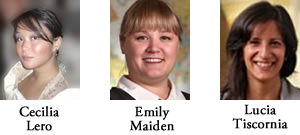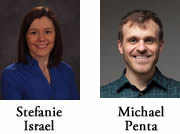
Five PhD candidates affiliated with the Kellogg Institute for International Studies have been selected by the US Agency for International Development (USAID) to receive USAID–Notre Dame Global Development Fellowships. Funding for the fellowships is shared by USAID and the Kellogg Institute and managed by the Notre Dame Initiative for Global Development (NDIGD).
"We are delighted to collaborate with NDIGD to support this USAID–Notre Dame partnership, says Kellogg Associate Director Sharon Schierling. Like the Kellogg Institute and NDIGD, the fellowships aim to solve development challenges through innovative research.
The awards also help us provide our students with invaluable opportunities to do fieldwork that advances not only their own doctoral research but also scholarship on Kellogg Institute themes of democracy and human development.
As part of the program, each of the five students will partner in Brazil or South Africa with host organizations that are at the cutting edge of their respective fields.
Research on democracy
 Three students are conducting research in conjunction with the Varieties of Democracy (V-Dem) project, an international effort based at the Kellogg Institute in the US and the University of Gothenberg in Sweden to develop new measures of democracy.
Three students are conducting research in conjunction with the Varieties of Democracy (V-Dem) project, an international effort based at the Kellogg Institute in the US and the University of Gothenberg in Sweden to develop new measures of democracy.
—Kellogg PhD Fellow Cecilia Lero (political science) looks forward to contributing to a deeper understanding of democratic development in the Global South in her work at the Fundação Getulio Vargas in Brazil. She will build a network of research, policy, and civil society contacts useful to both V-Dem and her own research in Brazil and the Philippines on how and why civil society organizations and social movements cooperate or compete in new democracies.
—Emily Maiden (political science and peace studies) will code democracy indicators in southern Africa from her base at the University of Cape Town in South Africa. For a scholar of modern politics in Africa, the opportunity to research and collaborate with African scholars is invaluable, she says.
—Kellogg PhD Fellow Lucia Tiscornia (political science) will train staff of the Institute for Justice and Reconciliation (IJR) in Cape Town to use the V-Dem dataset for a project on democracy and transitional justice. She will also conduct analysis for IJR on different aspects of democracy in the region. Finally, the fellowship will enhance my own research, she notes, with the network of new contacts she builds contributing to her dissertation on security sector reform in post-conflict societies.
Faculty Fellow Michael Coppedge sees great value in the fellowships from his perspective as a V-Dem co-PI. These three fellows will help V-Dem with the challenge of measuring democracy by globally comparable standards in countries as dissimilar as South Africa, Brazil, Zambia, the Philippines, and the United States, he says.
They will also help publicize V-Dem data among researchers in Brazil and South Africa. I hope that while they are abroad, they will build mutually beneficial networks that connect local researchers to counterparts in V-Dem and at the Kellogg Institute.
Research on human development
 The two fellowship recipients whose work focuses on issues of development will both work in Brazil.
The two fellowship recipients whose work focuses on issues of development will both work in Brazil.
—Kellogg PhD Fellow Stefanie Israel (sociology), who has previously conducted extensive field research in Brazil, will work at the Institute of Social and Political Studies at the State University of Rio de Janeiro (IESP-UERJ) to study the factors that lead to the success of police pacification programs in some of Rios favelas and their failure in others.
The USAID fellowship is a dissertation fieldwork dream-come-true: the funding I need to conduct exactly the research I want, working in conjunction with one of the most prominent experts on Rios favelas, she says.
— Kellogg Research Affiliate Michael Penta (sociology), a member of the NetSense research group within the Interdisciplinary Center for Network Analysis, will examine pacification within favelas in Rio from the perspective of social network analysis derived from smartphone data. His base will be the Center for Metropolitan Studies at the University of São Paulo.
USAID and Kellogg are allowing me to conduct a one-of-a-kind study on an important urban dynamic that occurs globally, he says. Favelas that have undergone pacification are experiencing significant changes in the economic and social structures that organize the local network. My research attempts to measure these changes.
The 5 Kellogg-affiliated recipients are among 12 Notre Dame students awarded the new fellowship, which expands USAIDs Research and Innovation Fellowship Program. Areas of research include science and engineering, physics, geosciences, computer and information science, psychology, and the biological and social sciences.
The University of Notre Dame is one of six universities selected by USAIDs new US Global Development Lab to offer the fellowships, which aim to create a global network of researchers addressing pressing needs in the developing world. The Notre Dame Initiative for Global Development (NDIGD) manages the fellowship program for Notre Dame.





